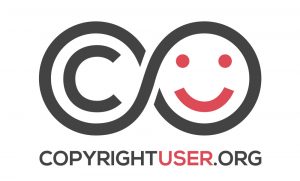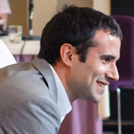 The producer of CREATe’s Copyright User Portal Bartolomeo Meletti explains a new partnership with the Digital Catapult (an innovation centre for the UK’s best digital ideas).
The producer of CREATe’s Copyright User Portal Bartolomeo Meletti explains a new partnership with the Digital Catapult (an innovation centre for the UK’s best digital ideas).
CREATe and the Digital Catapult have entered a partnership to develop a set of copyright information tools that are responsive to the needs of primary creators and creative businesses in the digital world. As lead producer of CopyrightUser.org (a widely used online copyright portal, which attracted over 40,000 users since its launch in March 2014), I am being seconded from CREATe to the Digital Catapult Centre in Euston Road, London. In partnership with the Digital Catapult, we are producing events with creative groups (such as photographers, musicians and the archive sector) and developing new sectoral copyright guidance, including several video assets.
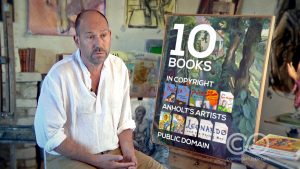 Decision-making around protection, exploitation and reuse of creative content is largely structured by copyright law, often without the participants’ awareness or knowledge. The CREATe Copyright User project (initiated by Bournemouth University and the University of Glasgow) adopts a bottom-up methodology to capture what information would be most useful for independent creators and digital SMEs in making these decisions. The design of the copyrightuser.org website and its content – produced and regularly updated by leading copyright experts – reflect the findings of these studies.
Decision-making around protection, exploitation and reuse of creative content is largely structured by copyright law, often without the participants’ awareness or knowledge. The CREATe Copyright User project (initiated by Bournemouth University and the University of Glasgow) adopts a bottom-up methodology to capture what information would be most useful for independent creators and digital SMEs in making these decisions. The design of the copyrightuser.org website and its content – produced and regularly updated by leading copyright experts – reflect the findings of these studies.
 The collaboration between CREATe and the Digital Catapult on the Copyright User project aims to extend this bottom-up approach, with focus on UK digital creative businesses. In particular, with the help of the Copyright Hub we are organising a series of workshops called ‘Understanding UK Copyright Law’, held at the Digital Catapult Centre. The goal of these workshops is to identify real concerns and questions about copyright across different sectors of the creative industries, with a view to developing sector-specific guidance.
The collaboration between CREATe and the Digital Catapult on the Copyright User project aims to extend this bottom-up approach, with focus on UK digital creative businesses. In particular, with the help of the Copyright Hub we are organising a series of workshops called ‘Understanding UK Copyright Law’, held at the Digital Catapult Centre. The goal of these workshops is to identify real concerns and questions about copyright across different sectors of the creative industries, with a view to developing sector-specific guidance.
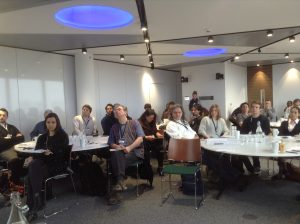 The first workshop of the series took place on 3rd December 2014 and was addressed to the photography sector. It brought together around 20 people, mainly professional photographers but also re-users of images such as media production companies. The second workshop was aimed at the music sector and attracted more than 40 attendees from London and across the UK, consisting of songwriters, composers, and music producers. Both events featured talks by a panel of copyright experts and lively discussions with the audience. Attendees were also asked to fill a form with their copyright questions. Live conversations and recorded questions highlighted different issues faced by these two sectoral groups. On the one hand, photographers were particularly concerned over the unauthorised use of their digital images and interested to know about enforcement options, such as the IPEC Small Claims Court. On the other hand, songwriters and composers seemed more worried about their co-authors and wanted more information on ownership of rights. Although focusing on different issues – unauthorised reuse and ownership of rights in cases of joint authorship – both groups shared a main concern: the territoriality of copyright law.
The first workshop of the series took place on 3rd December 2014 and was addressed to the photography sector. It brought together around 20 people, mainly professional photographers but also re-users of images such as media production companies. The second workshop was aimed at the music sector and attracted more than 40 attendees from London and across the UK, consisting of songwriters, composers, and music producers. Both events featured talks by a panel of copyright experts and lively discussions with the audience. Attendees were also asked to fill a form with their copyright questions. Live conversations and recorded questions highlighted different issues faced by these two sectoral groups. On the one hand, photographers were particularly concerned over the unauthorised use of their digital images and interested to know about enforcement options, such as the IPEC Small Claims Court. On the other hand, songwriters and composers seemed more worried about their co-authors and wanted more information on ownership of rights. Although focusing on different issues – unauthorised reuse and ownership of rights in cases of joint authorship – both groups shared a main concern: the territoriality of copyright law.
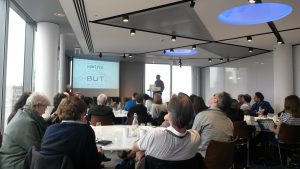 The next ‘Understanding UK Copyright Law’ workshop, which will be held on 29th September 2015, is being designed to explore challenges and opportunities faced by archivists and museum curators. It will be followed by a roundtable discussion about another big obstacle to the easy reuse of creative content: the ‘orphan works problem’. In October 2014, the UK government introduced a new licensing scheme that allows users to apply for a licence to use orphan works for both commercial and non-commercial purposes within the UK; and an orphan works copyright exception that enables certain uses of those works by UK cultural heritage institutions. The roundtable will bring together policy-makers, institutions and initiatives dealing (and struggling) with these new regulations, such as the ‘Digitising the Edwin Morgan Scrapbooks’ project. In this context, the Copyright Hub may play an important role: it could help reduce the risk of a work being deemed orphan and become one of the avenues through which the diligent search required by the new orphan works regulations is undertaken.
The next ‘Understanding UK Copyright Law’ workshop, which will be held on 29th September 2015, is being designed to explore challenges and opportunities faced by archivists and museum curators. It will be followed by a roundtable discussion about another big obstacle to the easy reuse of creative content: the ‘orphan works problem’. In October 2014, the UK government introduced a new licensing scheme that allows users to apply for a licence to use orphan works for both commercial and non-commercial purposes within the UK; and an orphan works copyright exception that enables certain uses of those works by UK cultural heritage institutions. The roundtable will bring together policy-makers, institutions and initiatives dealing (and struggling) with these new regulations, such as the ‘Digitising the Edwin Morgan Scrapbooks’ project. In this context, the Copyright Hub may play an important role: it could help reduce the risk of a work being deemed orphan and become one of the avenues through which the diligent search required by the new orphan works regulations is undertaken.
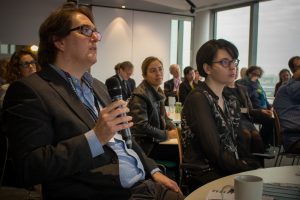 Decisions around the reuse of creative content include whether to work with licensed IP from a third party rightsholder or material from the public domain (e.g. novels whose authors died more than 70 years ago); or both. On 5th December 2014, around 60 delegates from transmedia businesses convened at the Digital Catapult Centre to reflect on the outcomes of ‘Valuing the Public Domain’, a major research and knowledge exchange project undertaken by CREATe with support of the UK Intellectual Property Office and co-funded by the Economic and Social Research Council (ESRC). One of the three core studies of the project consisted of interviewing 23 UK creative businesses about their exploitation of public domain content and their ability to generate value from these inputs. Some of the interviews were used to produce the video ‘SMEs, Copyright and the Public Domain’, the first piece of multimedia content for the upcoming SME section of CopyrightUser.org.
Decisions around the reuse of creative content include whether to work with licensed IP from a third party rightsholder or material from the public domain (e.g. novels whose authors died more than 70 years ago); or both. On 5th December 2014, around 60 delegates from transmedia businesses convened at the Digital Catapult Centre to reflect on the outcomes of ‘Valuing the Public Domain’, a major research and knowledge exchange project undertaken by CREATe with support of the UK Intellectual Property Office and co-funded by the Economic and Social Research Council (ESRC). One of the three core studies of the project consisted of interviewing 23 UK creative businesses about their exploitation of public domain content and their ability to generate value from these inputs. Some of the interviews were used to produce the video ‘SMEs, Copyright and the Public Domain’, the first piece of multimedia content for the upcoming SME section of CopyrightUser.org.
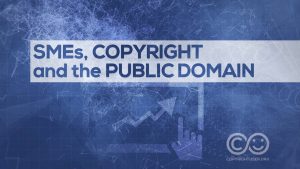 My experience at the Digital Catapult is an exciting opportunity to engage with primary creators and digital SMEs, and observe at first hand how the digital creative economy is evolving in different ways, at different levels within diverse sectors.
My experience at the Digital Catapult is an exciting opportunity to engage with primary creators and digital SMEs, and observe at first hand how the digital creative economy is evolving in different ways, at different levels within diverse sectors.


